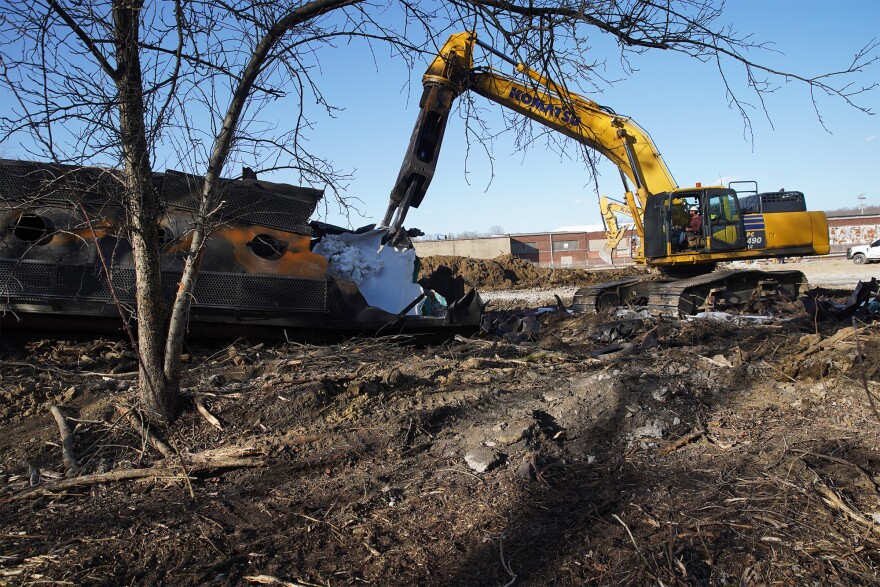Environmental, legal and health experts told East Palestine residents at a town hall meeting Thursday night they should be wary about the potential presence of dioxin in their soil and water.
Chemicals being carried on a train that derailed in East Palestine burned on Feb. 3, and a controlled release and burn of the chemicals on Feb. 5 sent a smoke plume into the air. Government officials said testing shows the air and water is safe, but experts say there is still cause for long-term concern.
Most notably are dioxins, University of Pittsburgh Associate Professor Carla Ng said, which are chemicals that form when other hazardous materials are burned.
“During fire, all the chemicals mix and they transform into other things,” Ng said. “Even dioxins is not just one chemical, it’s a class of chemicals, so they have to be testing for the suite of things that might occur.
Dioxins can be found in dust, and were present in the smoke plume over the town, Center for Health, Environment and Justice Science Director Stephen Lester said. The dense dioxin particles fall quickly, and likely contaminated soil and water in the area, he said, though it’s impossible to know how much dioxins are present without testing for them specifically.
“Testing is critical to define where the chemicals are,” Lester said, “and then, that’s the information you all need to use to clearly decide what you’re going to do.”
When asked about testing for dioxins at a news conference Tuesday, Environmental Protection Agency Administrator Michael Regan said he was unsure if the agency was testing for dioxins yet, but that it was “under discussion.”
The EPA must have known prior to the controlled release that burning chemicals on the train would create dioxins, Lester said.
“The EPA had to know when they were going to burn vinyl chloride that dioxin would be formed,” he said. “It’s criminal that they didn’t come forward with that.”
Experts emphasized that residents seek out independent testing from organizations unaffiliated with the EPA and the train derailment. Doing so, Ng said, will ensure residents have documentation of the presence of chemicals in and around their homes, which will aid them in getting compensation, or pursuing legal action down the line.
“As we think about who’s affected [and] how far should we be looking is a little bit about where those smoke plumes went, and then at what point would the different chemicals fall out,” she said. “This is why soil testing is so critical so we can start to understand the width of this cloud and how far things are affected.”
River Valley Organizing, a social justice organization that hosted the townhall, is in the process of facilitating independent testing for residents, founder and co-executive director Amanda Kiger said.
Attendees at the townhall were invited sign up to be contacted about testing as early as Saturday, Kiger said. Any one else interested in testing can contact her by email at amandakiger@rivervalleyorganizing.org.
Residents express concerns over health and safety
Residents were concerned with their ability to go about their everyday lives without being exposed to chemicals left in the area after the derailment.
Amazing meeting last night in East Palestine!
— River Valley Organizing (@RiverValleyOrg) February 24, 2023
No matter what you look like or who you vote for, we all agree that every family deserves clean water and safe homes. Together, we can clean up our community, hold Norfolk Southern accountable, and keep this from happening again. pic.twitter.com/ksTizs1IxT
Many asked experts about the likelihood of contamination in the local creek, and shared antidotes about seeing chemicals in the water once the sediment at the bottom of the creek is disturbed.
Executive Director of Three Rivers Waterkeeper Heather Hulton VanTassel said she went through the EPA’s water contamination reports, and advised residents to be cautious in local waterways.
‘The [EPA] statements that it’s not contaminated is false,” she said. “You will find 15 sites that are highly contaminated. … We know vinyl chloride, for instance, was dumped, and this was over 5,000 parts per billion found in surface water.”
She added that residents shouldn’t believe that water is safe just because water sampling tests showed no contamination at one part of the creek.
“I would highly recommend staying away from surface water until you can have someone come at your exact location along a run and say whether it's safe or not,” she said. “Yes, they might do 50 tests, but if you’re the fifty-first location that hasn’t been tested, they cannot tell you it’s safe.”
One resident asked how wildlife might be impacted by chemicals in and surrounding East Palestine.
“I try to use wildlife to subsidize food for my family, and I know this community and outside this community does the same thing,” he said. “How far down the watershed do people in the [community] and further communities have to be worried about the deer, fish, squirrels, rabbits, all of that?”
Dioxins are fat soluble, Lester said, meaning that they bind and accumulate to fats in meat and fish once an animal ingests them.
“If a cow eats grass where dioxin has settled from the air, it gets … into the cow,” he said. “That means it gets into the milk, because that’s fat soluble, it gets into the hamburger and so on.”
Ng alerted residents of the risk associated with eating raised livestock or hunted wildlife while the presence and levels of dioxins are unknown.
“The same way that they recommended ‘until your well water is tested, drink bottled water,’ if there is a … contaminant like dioxin present, it helps to make sure you’ve got a clean source of feed,” she said. “By having a clean source of food, you can reduce exposure.”
Expert shares legal advice for affected residents
Other residents pressed panelists about how to pursue legal action against Norfolk Southern, but John Heer, an attorney with Fair Shake Environmental Legal Services, said there’s not much residents can do at this point
“You can certainly put a lot of pressure on, say, the attorney generals of each state, or eventually, maybe the federal attorney general,” Heer said. “You can put pressure on them, but they have discretion, and it’s a political ballgame.”
Heer added the best thing residents can do is call their local and federal legislators to ensure their voices are heard.
“Flood them with e-mails, phone calls, tell all your neighbors, tell all your family, friends et cetera,” he said. “The squeaky wheel does get the grease. It does work that way.”






